

Statewide Family Engagement Center – Building Capacity in every community in Hawaiʻi. One of the toughest decisions young parents have to make is whether or not to send a child to daycare.
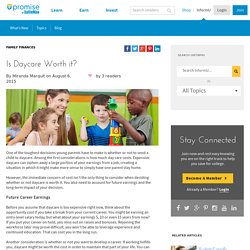
Among the first considerations is how much day care costs. Expensive daycare can siphon away a large portion of your earnings from a job, creating a situation in which it might make more sense to simply have one parent stay home. However, the immediate concern of cost isn’t the only thing to consider when deciding whether or not daycare is worth it. You also need to account for future earnings and the long-term impact of your decision. Future Career Earnings Before you assume that daycare is too expensive right now, think about the opportunity cost if you take a break from your current career.
Respect the Child. Let’s Get Ready for Kindergarten! Spring is here.
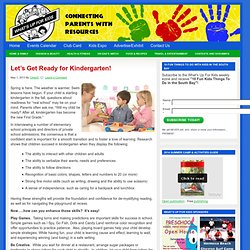
The weather is warmer. Swim lessons have begun. If your child is starting kindergarten in the fall, questions about readiness for “real school” may be on your mind. Parents often ask me, “Will my child be ready? After all, kindergarten has become the new First Grade.” In interviewing a number of elementary school principals and directors of private school admissions, the consensus is that a confident start is important for a smooth transition and to foster a love of learning. The ability to interact with other children and adultsThe ability to verbalize their wants, needs and preferencesThe ability to follow directionsRecognition of basic colors, shapes, letters and numbers to 20 (or more)Strong fine motor skills (such as writing, drawing and the ability to use scissors)A sense of independence, such as caring for a backpack and lunchbox Now…..how can you enhance those skills?
Play Games. Be Creative. Add a Little Magic. Model Problem Solving and Risk Taking. Read Aloud. Office of Child Development.
Has Parenting Gotten Harder? A White House tweet this week encouraged followers to “Spread the word about President Obama’s plan to provide high-quality preschool for every kid in America.”
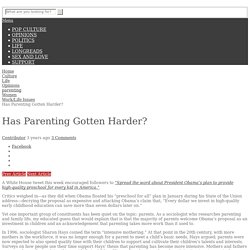
Critics weighed in—as they did when Obama floated his “preschool for all” plan in January during his State of the Union address—decrying the proposal as expensive and attacking Obama’s claim that, “Every dollar we invest in high-quality early childhood education can save more than seven dollars later on.” Yet one important group of constituents has been quiet on the topic: parents. As a sociologist who researches parenting and family life, my educated guess that would explain that is that the majority of parents welcome Obama’s proposal as an investment in children and an acknowledgement that parenting takes more work than it used to. In 1996, sociologist Sharon Hays coined the term “intensive mothering.” Guest contributor Sinikka Elliott is an assistant professor of sociology at North Carolina State University. 4 Strategies to Expand Your Child's Education. It’s a tale of two worlds.
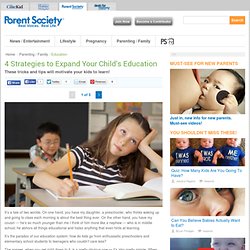
On one hand, you have my daughter, a preschooler, who thinks waking up and going to class each morning is about the best thing ever. On the other hand, you have my cousin — he’s so much younger than me I think of him more like a nephew — who is in middle school; he abhors all things educational and hates anything that even hints at learning. It’s the paradox of our education system: how do kids go from enthusiastic preschoolers and elementary school students to teenagers who couldn’t care less? The answer, when you get right down to it, is a pretty obvious one — it’s also pretty simple. When kids don’t see learning as a chore, they are more excited about it; having fun becomes the motivating factor.
I spent some time interviewing my daughter’s preschool teachers — both of whom have education degrees — as well as another close friend, a curriculum coordinator at the elementary school level, who has her Master’s degree. Autism Facts - Autism Research. When he turned 5 in October, Spike Robinson celebrated with his parents, three siblings, and a pink cake decorated with M&M's and lollipops.
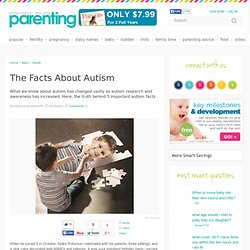
It was your standard birthday bash—except when it was time to sing. “Spike asked us to do it very slowly, and in a whisper,” recounts his mom, Shavon Brown-Robinson, who lives in Dania, FL. “And then he didn't want us to cut the cake. He didn't want it ruined.” He finally relented—and then burst into tears. For most kids, a birthday party is a milestone; for Spike, it was a miracle. Spike was indeed diagnosed with autism, also known as autism spectrum disorder (ASD), which ranges from mild social awkwardness to sensory problems (trouble dealing with certain sounds or textures) to an inability to talk or take care of oneself at all. “I was so scared for that diagnosis,” Brown-Robinson confesses, “but the moment we got it, the doors started flying open.” Before Spike was born, such a story might not have existed. The Educators' Spin On It.